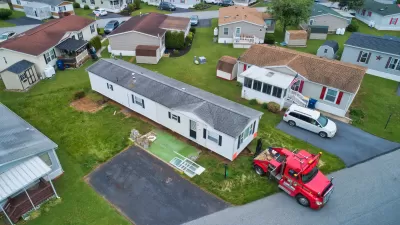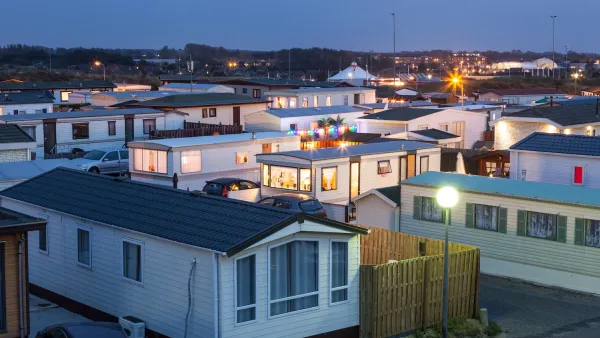After declaring a housing crisis, the Virginia capital’s city council voted against a proposed manufactured home warehouse that would distribute replacements for aging manufactured housing stock.

A proposed manufactured housing project was denied a permit in Richmond, Virginia, despite a growing housing crisis in that city, one so severe it was officially recognized by the city council just two weeks prior to the project’s rejection.
As Wyatt Gordon explains in Greater Greater Washington, “Beyond the details of the drama between 9th District Councilmember Mike Jones — a rising star in the commonwealth’s Democratic Party — and one of Richmond’s premier housing nonprofits, the impasse boiled down to whether a warehouse should be sited next to single-family housing. The lot Project:HOMES hoped to turn into a production facility for manufacturing affordable mobile homes is currently zoned R-3, not industrial.” Jones expressed concerns about industrial uses in low-income neighborhoods.
A 2016 report from the Manufactured Home Community Coalition of Virginia found that less than half of the state’s mobile home parks scored more than 50 percent on housing quality indicators. “With Project:HOMES’ plans for an innovative facility to manufacture replacement units rightly or wrongly now on ice, the problem of substandard housing across the region’s mobile home parks persists.”
Neighboring communities could step in. “Since City Council shot down the warehouse’s initial Southside location, Project:HOMES has heard from the neighboring counties of Henrico and Chesterfield who would be more than happy to find a site for a model affordable housing nonprofit looking to grow.”
FULL STORY: The manufacture of affordable housing bumps up against Richmond’s inequitable zoning

Planetizen Federal Action Tracker
A weekly monitor of how Trump’s orders and actions are impacting planners and planning in America.

Maui's Vacation Rental Debate Turns Ugly
Verbal attacks, misinformation campaigns and fistfights plague a high-stakes debate to convert thousands of vacation rentals into long-term housing.

San Francisco Suspends Traffic Calming Amidst Record Deaths
Citing “a challenging fiscal landscape,” the city will cease the program on the heels of 42 traffic deaths, including 24 pedestrians.

Amtrak Rolls Out New Orleans to Alabama “Mardi Gras” Train
The new service will operate morning and evening departures between Mobile and New Orleans.

The Subversive Car-Free Guide to Trump's Great American Road Trip
Car-free ways to access Chicagoland’s best tourist attractions.

San Antonio and Austin are Fusing Into one Massive Megaregion
The region spanning the two central Texas cities is growing fast, posing challenges for local infrastructure and water supplies.
Urban Design for Planners 1: Software Tools
This six-course series explores essential urban design concepts using open source software and equips planners with the tools they need to participate fully in the urban design process.
Planning for Universal Design
Learn the tools for implementing Universal Design in planning regulations.
Heyer Gruel & Associates PA
JM Goldson LLC
Custer County Colorado
City of Camden Redevelopment Agency
City of Astoria
Transportation Research & Education Center (TREC) at Portland State University
Jefferson Parish Government
Camden Redevelopment Agency
City of Claremont





























